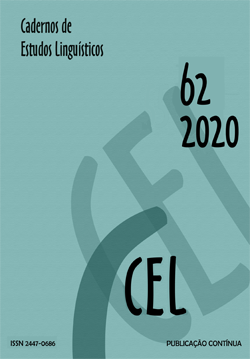Resumo
O objetivo deste artigo é apresentar uma análise de advérbios em –mente na posição de modificação adjetival. Nosso recorte se restringe a duas classes: modificadores de graus – advérbios do tipo extremamente – e modificadores não-restritivos – advérbios do tipo indiscutivelmente. Buscamos justificar a existência dessas duas classes pelo comportamento sintático e semântico de seus membros. Os integrantes da primeira modificam adjetivos graduais, apresentam um esvaziamento semântico do adjetivo base e só aparecem em posição contígua aos adjetivos. Os integrantes da segunda não atuam sobre grau, mantêm o significado do adjetivo base e, quando destacáveis do adjetivo, apresentam significado similar, que inclui a atitude do falante.
Referências
BACH, K. The myth of conventional implicatures. Linguistics & Philosophy, vol. 22, n. 4, 327-366, 1999.
BASILIO, M. Morfológica e Castilhamente: um Estudo das Construções X-mente no Português do Brasil. DELTA: Documentação de Estudos em Linguística Teórica e Aplicada, n. 14 (n. especial), 17-28, 1998.
BASÍLIO, M. Formação e Classes de Palavras no Português Brasileiro. São Paulo: Contexto, 2004.
BURNETT, H. A delineation solution to the puzzles of absolute adjectives. Linguistics & Philosophy, n. 37, 1-39, 2014.
CASTILHO, A. T.; ILARI, R. Advérbios predicadores. In: ILARI, Rodolfo; NEVES, Maria Helena Moura. (Org.) Gramática do Português Culto Falado no Brasil - Vol. II. Classes de palavras e processos de construção. Campinas: Unicamp, 2008. p. 413-456.
CASTROVIEJO, E. Adverbs in restricted configurations. In: BONAMI, O.; P. Cabredo Hofherr (eds.). Empirical Issues in Syntax and Semantics 7, 2008. 53–76.
CASTROVIEJO, E. Gradation in modified AdjPs. Proceedings of SALT 22, 2012, 83-103.
CEGALLA, D. P. Novíssima gramática da língua portuguesa. 27. ed. São Paulo: Companhia Editora Nacional, 1985.
DEMONTE, V. Adjectives. In: von HEUSINGER, K.; MAIENBORN, C.; PORTNER, (eds.) Semantics: an international handbook of natural language meaning. Berlin: Walter de Gruyter, 2011. Vol. II. p. 1314-1340.
den DIKKEN, M.; BERNSTEIN, J.; TORTORA, C. e ZANUTTINI, R. Data and grammar: means and individuals. Theoretical Linguistics, n. 33, p. 335-352, 2007.
DOETJES, J. Adjectives and degree modification. In:McNALLY, L.; KENNEDY, C. (eds.) Adjectives and Adverbs: syntax, semantics and discourse. Oxford: Oxford University Press, 2008. p. 123-155.
GEHRKE, B.; CASTROVIEJO, E. Manner and degree: an introduction. Natural language and Linguistic Theory, 33, p. 745-790, 2015.
GRICE, H. P. Logic and conversation. In: _____. Studies in the way of words. Cambridge: Harvard University Press, 1989. p. 22-40. [1975]
GUIMARÃES, M. Dos Intensificadores como Quantificadores: Os Âmbitos de Expressão da Quantificação no Português do Brasil. Tese (Doutorado em Linguística). Universidade Federal do Paraná, Curitiba, 2007.
GUTZMANN, D. Expressives and beyond. An introduction to varieties of use-conditional meaning. In: Gutzmann, Daniel & Hans-Martin Gärtner (eds.): Beyond Expressives. Explorations in Use-Conditional Meaning. Current Research in the Semantics Pragmatics-Interface (CRiSPI) 28. Leiden: Brill, 2013. p. 1-58.
ILARI, R. et alii. Considerações sobre a ordem dos advérbios. In: CASTILHO, A. T. (org.) Gramática do Português Falado. Volume I: A Ordem. Unicamp: Editora da Unicamp, 1993. p. 65-140.
JACKENDOFF, R. Semantic Interpretation in Generative Grammar. Cambridge, MA: MIT Press, 1972.
KATZ, G. Attitudes toward degrees. In: MAIER, E.; BARY, C.; HUITINK, J. (eds.) Proceedings of SuB9, 2005. p. 183-196.
KENNEDY, C. Projecting the adjective. PhD Dissertation. University of California at Santa Cruz, 1997.
KENNEDY, C.; MCNALLY, L. The syntax and semantics of multiple degree modification in English. In: MULLER, S. (ed.) Proceedings of the HPSG05 Conference. Department of Informatics, University of Lisbon, CSLI Publications, 2005a.
KENNEDY, C.; MCNALLY, L. Scale structure, degree modification, and the semantics of gradable predicates. Language, 81(2), 345-381, 2005b.
KLEIN, E. 1980. A semantics for positive and comparative adjectives. Linguistics and Philosophy, n. 4, 1-45, 1980.
LEVINSON, S. Presumptive meanings. Cambridge: MIT Press, 2000.
MARTINHO, F. J. S. Sintaxe e semântica dos adjetivos graduáveis em português. Tese (Doutorado em Linguística). Universidade de Aveiro, Aveiro, 2007.
MORZYCKI, M. Nonrestrictive modifiers in non-parenthetical positions. In McNALLY, L.; KENNEDY, C. (eds). Adjectives and Adverbs: syntax, semantics and discourse. Oxford: Oxford University Press, 2008a.
MORZYCKI, M. Adverbial modification of adjectives: evaluatives and a little beyond. In: DÖLLING, J.; HEYDE-ZYBATOW, T. (eds.). Event Structures in Linguistic Form and Interpretation. Mouton de Gruyter, Berlin, 2008b.
MORZYCKI, M. Modification. Cambridge: Cambridge University Press, 2016.
OLIVEIRA, F.; MENDES, A. Modalidade. In: RAPOSO, E. B. P. et alii. Gramática do Português. Lisboa: Fundação Calouste Gulbenkian, 2013. p. 623-669.
PERINI, M.; OTHERO, G. A. Córpus, Introspecção e Objeto da Descrição Gramatical. Signo, 35 (59), 2-12, 2010.
PIRES DE OLIVEIRA; R.; BASSO, R. M. Arquitetura da conversação: teoria das implicaturas. São Paulo: Parábola, 2014.
POTTS, C. The logic of conventional implicatures. PhD Dissertation. University of California at Santa Cruz, 2003.
POTTS, C. The expressive dimension. Theoretical Linguistics, 33(2), 165-198, 2007.
van ROOIJ, R. Vagueness in linguistics. In: RONZITTI, G. (eds.). Vagueness: a guide. Springer, 2011. p. 123-170.
von STECHOW, A. Comparing Theories of Comparison. Journal of Semantics, n. 3, 183-199, 1984.
ZAGONA, K. Mente Adverbs, Compound Interpretation and the Projection Principle. Probus, vol. 2.1, 1-30, 1990.

Este trabalho está licenciado sob uma licença Creative Commons Attribution-NonCommercial 4.0 International License.
Copyright (c) 2020 Cadernos de Estudos Lingüísticos


